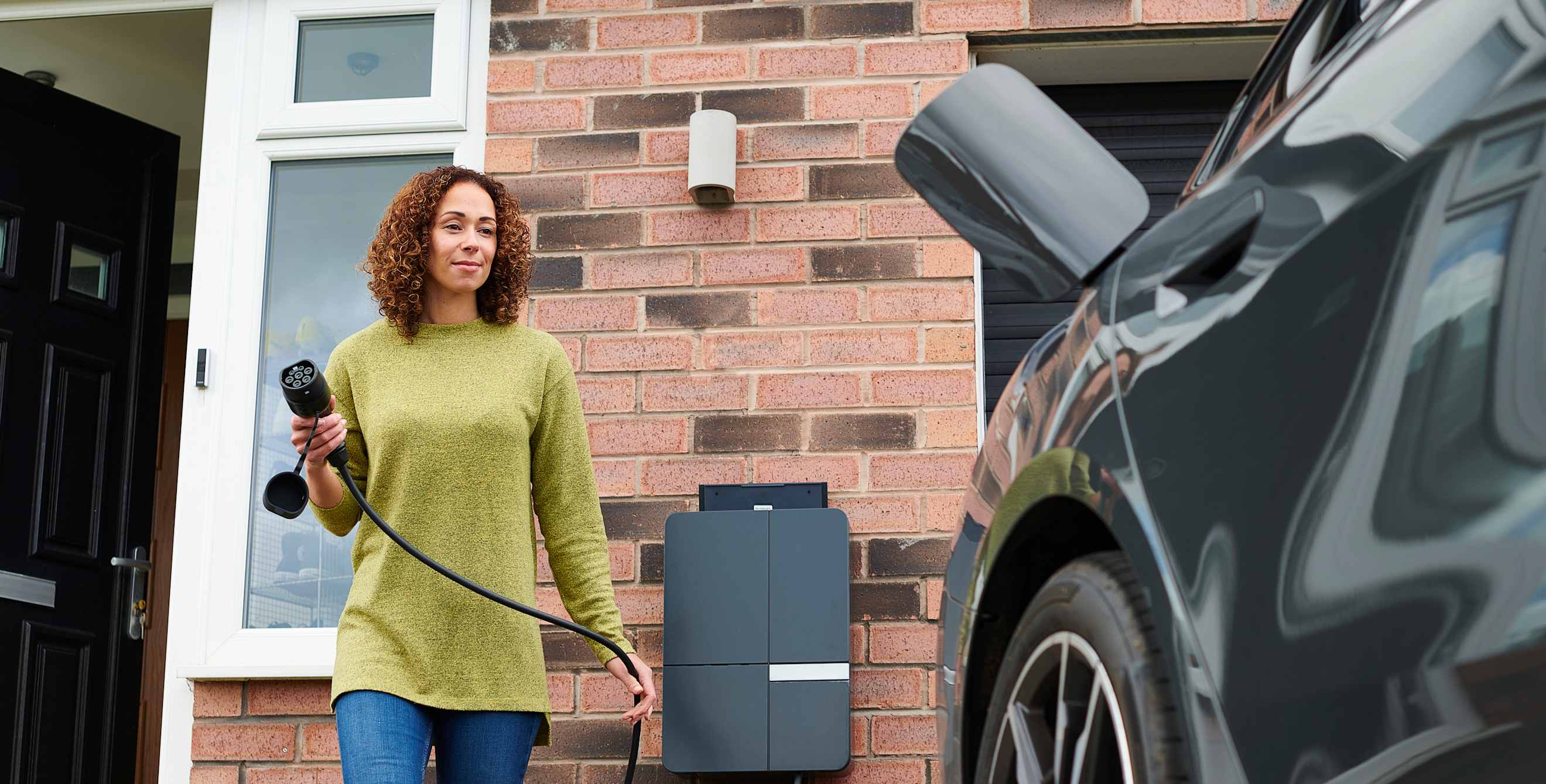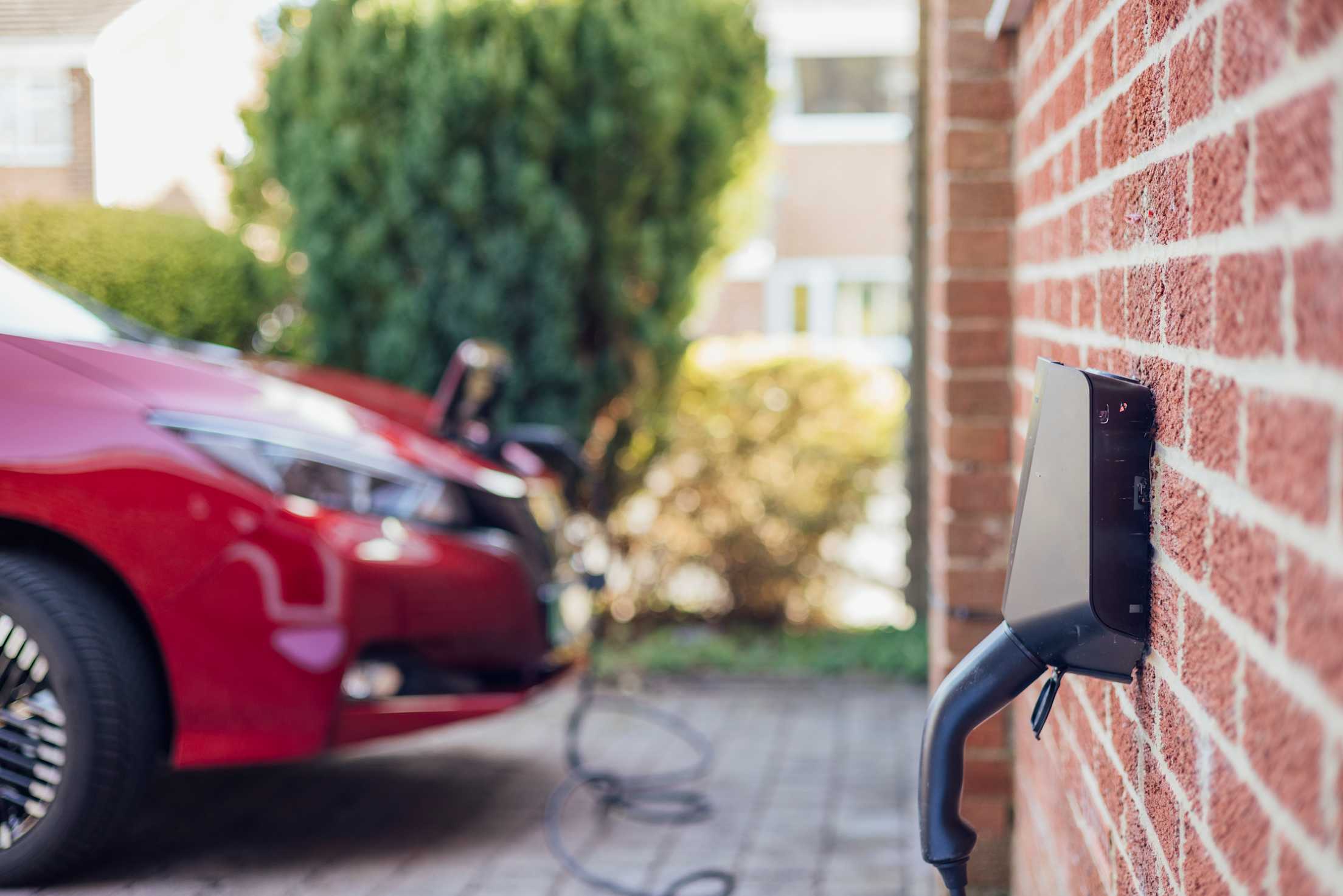Cost of a home EV charging station
Tips about powering up at home

The first thing we recommend is to take a look at the expenses, including the charging station and installation costs. Keep in mind that you could just plug your car into the wall and avoid these expenses altogether.
If you opt for a home charging station, many are available for purchase from retailers like Walmart, Home Depot, and Amazon. For $400-700, you can walk away with a charger.
The cost and time to fully install the system depends on whether your electrician will have to install new wiring, an additional circuit, a subpanel, or other equipment. If your home already has robust electrical service, and your main electrical panel has the necessary open capacity, your installation may be a bit less complicated for a certified electrician. Do note that depending on where you live, a straightforward installation may run $500 on average.
As with any home improvement, it makes sense to ask for a written estimate prior to starting installation.
Save money on a home charging system with rebates and credits
Great news! If you decide to install a home charging system, there is a federal tax credit for purchasing and installing a home charging station. You can claim 30% of the cost of hardware and installation, up to $1,000, assuming you have a federal tax liability greater than the credit itself. For details on this credit, visit this website.
In addition, local and regional incentive programs may offer more help to offset the cost of installing a charging station as well as upgrading your electrical panel.

Benefits of charging at home
Charging at home is the most convenient and lowest-cost way to charge your electric vehicle. While public charging stations are helpful when you're on the road, home charging allows you to start each day with a sufficiently charged battery without extra expense or hassle. Additionally, many utilities offer special rates for EV charging, making it even more economical.
Level 1 vs level 2 home chargers
Now that you know charging at home is convenient and easy, let's talk about the two main types of home chargers: Level 1 and Level 2. Level 1 chargers can be plugged into a standard outlet and provide enough range for most drivers who travel less than 40 miles per day. On the other hand, Level 2 chargers require a 240v outlet but can recharge your battery much faster, and are recommended for people who drive more than 40 miles per day.
Charging Level | Rate of Charge, based on vehicle | Charger & Installation Cost | Outlet Required |
|---|---|---|---|
Level 1 | 3-6 miles/hour | $0 | Standard 120 v |
Level 2 | 20-30 miles/hour | $1,000 - $1,900 | Standard 240 v |
Benefits of level 1
According to the U.S. Department of Transportation and Kelley Blue Book, U.S. drivers put in 37 miles a day, on average, behind the wheel.
If that’s you, hooray! You don’t need to buy a home charging station. Just plug your EV charging cable into a standard home outlet. That’s Level 1, in the language of EV charging. Overnight, you can add about 40 miles to your battery. You can always upgrade to a Level 2 station in the future if you find you need it.
Benefits of level 2
If you regularly drive longer distances, you might consider purchasing a Level 2 station, which charges at a rate of about 25 miles per hour. For Tesla owners, it's important to note that a separate charging station is not required; instead, you can use a Tesla Mobile Connector, available for purchase on the Tesla website.
Here’s a handy tip to save on costs: use a smart splitter for Level 2 charging! This device allows you to use a single 240V outlet for both your EV charger and another 240V appliance, like your dryer, eliminating the need for a separate installation. Check out this popular product.
How to find a certified electrician installer near you
Finding a certified electrician to install your charger is the crucial next step. They will assess your electrical panel, and, if needed, they can install a 240V outlet where you’ll plug in a charging station.
To find an electrician, ask around for recommendations. Friends and neighbors can often suggest one or you can go online to review recommendations on Nextdoor or Yelp.
Frequently asked questions: Cost of home EV charging station
Is it cheaper to charge at home or at a public charging station?
Charging at home can be significantly cheaper than using public charging stations, potentially saving you up to 75% of the cost of public charging.
How much does it cost to add an electrical outlet for a car?
A 240-volt outlet, charger, and wall-mounted system typically ranges from $500 to $1,700. However, costs can vary based on several factors including distance from the electrical panel, the current capacity of your panel, and local labor rates.
Do I need special equipment to charge my EV at home?
Most EVs include a cable for charging via a standard 120-volt household outlet, adding about 30-40 miles of range overnight. If a faster charge is needed, a 240-volt outlet and Level 2 charging station are required. However, Tesla owners can buy a special cable to directly plug into a 240-volt outlet, eliminating the need for a charging station.
Should I plug in my EV every night?
There is no downside to keeping your car plugged in, and it's best to maintain the battery level between 20% and 80% for optimal battery health, unless you are going on a road trip and need a full charge. Additionally, it's recommended to set your charging schedule to match off-peak electricity rates for cost savings.
Plug in. Feel good. Drive on!